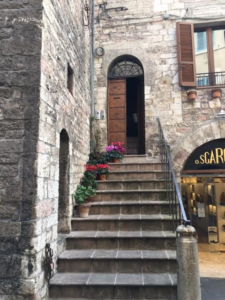December 22nd, 2016
A Lesson in Hospitality
Elizabeth Donahue, RN, MSN, NP-C
A couple of weeks ago I was wandering through the centuries-old walled city of Assisi in the central region of Italy. I was lost in the quaintness of the cobblestone streets, the piazzas, the fountains … and then curiously interested in the oldest thing I had ever seen up until that point (having not yet reached our destination of Rome, the Eternal City) — the Temple of Minerva erected in the 1st century BC. I started thinking to myself — looking at all the beautiful white stone, the view of the city in the valley from our perch atop a hill — if nursing doesn’t work out for me, I could definitely move to Assisi. And then I heard our tour guide, Giuseppe, start chatting about the town hospital. So much for my vacation mentality.
He told the story of a building that was located in close proximity to a monastery, a convent,  and a cathedral. My friend Giuseppe — a farmer who tended to olive trees and goats most days of the week but on others was a secret historical expert tending to groups of tourists tromping through his father’s hometown — began to explain the hospital of the 15th century. He told us of the hospital as a resting place for those who were suffering, a refuge for those with few resources — the poor, the hungry, the sick. They came to this place to be cared for, to rest, to receive what the monks and nuns all those centuries ago had to give — they came to receive hospitality.
and a cathedral. My friend Giuseppe — a farmer who tended to olive trees and goats most days of the week but on others was a secret historical expert tending to groups of tourists tromping through his father’s hometown — began to explain the hospital of the 15th century. He told us of the hospital as a resting place for those who were suffering, a refuge for those with few resources — the poor, the hungry, the sick. They came to this place to be cared for, to rest, to receive what the monks and nuns all those centuries ago had to give — they came to receive hospitality.
I think I had an existential revelation in that moment (one of many to be fair): Who could go to Venice and not be mesmerized? Who could gaze at the ceiling of the Sistine Chapel and not be moved to feel something bigger than themselves? But also this one, a revelation standing in front of a hospital built in the 1400s, on a tiny street in the small town of Assisi, thousands of miles from home: I could stand in that place finally appreciating the meaning behind the place where I spend 40 (or let’s be honest, more like 60) hours of my week. A hospital, the place where one sought hospitality.
Seven hundred years later, I don’t think it’s just the etymology of the word hospital that gives it the same meaning as that small white stone building in Italy. The same spirit lives inside the doors of Brigham and Women’s Hospital — and I have the privilege to see it every day. We may not be wearing habits or robes (scrubs are more practical and comfortable), and life is generally much more secular here, but we are providing the same basic services for people from all walks of life that the clergy of the 15th century set out to offer. Staff from all disciplines (registrars, nurses, florists, providers, valets) are essentially hosts for our patients. We listen to them when they tell us what type of aid they are seeking, we help determine what they need, and we do our best to provide it. So while over the course of many years, our specialties, education, titles, technology, and so much else has changed, it still comes down to this place of hospitality, a place for those in need to seek care and others being present to provide it. It is certainly a reminder for this provider to be the best host I can be.
Hospitality — the friendly and generous reception and entertainment of guests, visitors, or strangers
Hospital — a charitable institution for the needy, aged, infirm, or young





Excellent! And I agree. People come to us and the first thing they need to know is that we are in their corner. Second is that we are the best at we we do.
While I think your guide did some dressing up of hospitals (think of mental illness), your blog struck a chord with me and I hope others also.
Dave